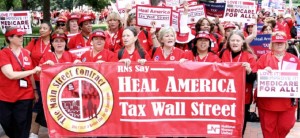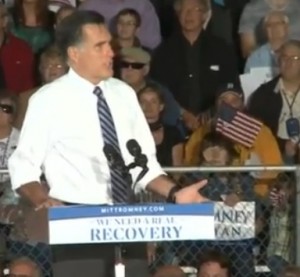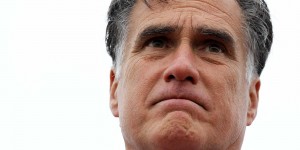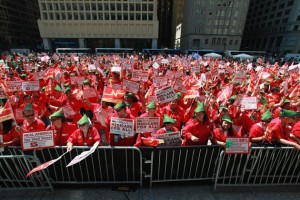Texas is number one in the country for people without health insurance. Fully one quarter of Texans have no health insurance at all. Another 26% are on Medicaid, Medicare or other public assistance programs that provide help to get health care, according to the Texas Medical Association. The poverty rate in Texas is also high. Twenty-one percent of adults, 17% of the elderly and 34% of Texas’ children live in poverty. Despite these dire circumstances, Texas Gov. Rick Perry is refusing an offer from the federal government to expand Medicaid, even though the feds will pick up 100% of the cost for the first three years. The reimbursement rate will drop to 90 percent after that. The offer is part of the Patient Protection and Affordable Care Act, or “Obamacare,” a slate of changes to health insurance enacted in the U.S. that Gov. Perry and some other Republican governors dislike. Last July, Perry wrote a letter to the U.S. Department of Health and Human Services last July (pdf) in which he called the offer to expand Medicaid a “gun to the head” of his state. He called the Affordable Care Act a “power grab,” and reiterated that statement in a November 18 blog post on his personal website. By refusing to accept the federal assistance to expand Medicaid, Gov. Perry is turning down $164 billion that would go to help insure the poorest Texas citizens. The assistance would also stimulate Texas’ economy. An analysis by the Center for Public Priorities, a think tank based in Austin, found that every federal dollar the state would spend on Medicaid assistance would return $1.29 in “dynamic state government revenue” over the first ten years of expansion, since Medicaid expenditures generate economic activity while creating a healthier, more productive population.
Category: Economics
Economics, Ethics, Front groups, Lobbying, Marketing, Propaganda, Secrecy
New Youth Front Group Agitates for Cuts to Entitlement Programs
by • • 0 Comments
 Salon.com reports a new “youth” front group has appeared consisting of young people who have ostensibly joined together to fight the federal debt. The group, called “The Can Kicks Back,” issued a press release November 12 announcing its creation and casting itself as a “nationwide grassroots campaign.” The Can Kicks Back gives no physical address on its website, but Salon.com reports the group shares the same address as the New America Foundation, which receives funding from the Peter G. Peterson Foundation, among other foundations and big corporations. Peter Peterson is a Wall Street hedge fund billionaire who, according to Huffington Post, has “has personally contributed at least $458 million to the Peter G. Peterson Foundation to cast Social Security, Medicare, Medicaid and government spending as in a state of crisis, in desperate need of dramatic cuts.” Other prominent funders of the New America Foundation include Google, Microsoft, Nike, Merck, and Aetna insurance. Interestingly, Kick the Can’s advisory board consists mostly of older politicians like Alan Simpson, 81, former Republican senator from Wyoming, Erskine Bowles, 67, former Clinton chief of staff, Mickey Edwards, 75, former Republican congressman from Oklahoma. Salon.com reports that this isn’t Pete Peterson’s first attempt to form an astroturf “youth group” to agitate for cutting entitlement programs. In the 1990s Peterson funded two groups, one called “Third Millennium” and another called “Lead…or Leave,” basically to do the same thing. In fact, Jonathan Cowan, who headed up Lead…or Leave, now is on The Can Kicks Back’s advisory board.
Salon.com reports a new “youth” front group has appeared consisting of young people who have ostensibly joined together to fight the federal debt. The group, called “The Can Kicks Back,” issued a press release November 12 announcing its creation and casting itself as a “nationwide grassroots campaign.” The Can Kicks Back gives no physical address on its website, but Salon.com reports the group shares the same address as the New America Foundation, which receives funding from the Peter G. Peterson Foundation, among other foundations and big corporations. Peter Peterson is a Wall Street hedge fund billionaire who, according to Huffington Post, has “has personally contributed at least $458 million to the Peter G. Peterson Foundation to cast Social Security, Medicare, Medicaid and government spending as in a state of crisis, in desperate need of dramatic cuts.” Other prominent funders of the New America Foundation include Google, Microsoft, Nike, Merck, and Aetna insurance. Interestingly, Kick the Can’s advisory board consists mostly of older politicians like Alan Simpson, 81, former Republican senator from Wyoming, Erskine Bowles, 67, former Clinton chief of staff, Mickey Edwards, 75, former Republican congressman from Oklahoma. Salon.com reports that this isn’t Pete Peterson’s first attempt to form an astroturf “youth group” to agitate for cutting entitlement programs. In the 1990s Peterson funded two groups, one called “Third Millennium” and another called “Lead…or Leave,” basically to do the same thing. In fact, Jonathan Cowan, who headed up Lead…or Leave, now is on The Can Kicks Back’s advisory board.
Advertising, Corruption, Economics, Elections, Ethics, Lies, politics, Propaganda
Romney Doubles Down on Lie Told to Ohioans
by • • 0 Comments
GOP Presidential candidate Mitt Romney openly lied — again — at a campaign event in Defiance, Ohio Thursday, October 25, when he told a crowd of about 12,000 that Jeep is considering shifting all of its North American production to China. “I saw a story today that one of the great manufacturers in this state, Jeep, now owned by the Italians, is thinking of moving all production to China,” Romney said. The statement is verifiably false. Chrysler’s vice president of communications, Gualberto Ranieri, publicly corrected Romney in a blog post on the company’s website. “Let’s set the record straight,” Ranieri wrote, “Jeep has no intention of shifting production of its Jeep models out of North America to China.” Representatives from Romney’s campaign said candidate had misread the first two paragraphs of a Bloomberg news report that discussed the manufacture of Jeeps for the Chinese market. The article started out by saying Fiat, the company that now owns Chrysler, “plans to return Jeep output to China and may eventually make all of its models in the country.” It said that Chrysler and Fiat are evaluating additional production sites in China, not that they are shifting their output from North America to China. Despite being publicly called out on the purported error by Chrysler, neither Romney nor his campaign workers have corrected the erroneous statement. Quite the contrary — the Romney campaign has built on it. Romney has created a new campaign ad around his misleading statement. The ad says, “Obama took GM and Chrysler into bankruptcy and sold Chrysler to Italians who are going to build Jeeps in China. Mitt Romney will fight for every American job.” The Salt Lake City (Utah) Tribune, a conservative newspaper in the home of Mormonism, endorsed President Obama in an October 19th editorial titled “Too Many Mitts”, that called Romney the Republican Party’s “shape-shifting nominee.”
Corporations, Economics, Ethics, Health care, Human rights, Lies, Marketing, politics, Secrecy, Tobacco, Women
Under Mitt Romney, Bain Made Millions on Tobacco
by • • 0 Comments
Mitt Romney’s former company, Bain Capital, may refuse to make public the clients it has served, but now previously-secret tobacco industry documents reveal Bain & Company worked closely with cigarette makers British American Tobacco, Philip Morris and Gallaher, to help them expand their markets and become more profitable at the expense of global public health. Bain helped British American Tobacco (BAT) crack open the cigarette market in Russia and transform it into a lucrative business at a time when American tobacco companies were under pressure at home and smoking rates in the U.S. were decreasing. By 1993, during the time when Bain worked with cigarette makers, the dangers of smoking were well established. The 1964 Surgeon General’s report had announced that cigarettes caused cancer. In 1988 the U.S. government warned that nicotine was addictive in a similar manner as heroin and cocaine. In 1989 the Surgeon General announced that most people begin smoking as children and one in every six Americans was dying from smoking. In 1993 the EPA rated secondhand tobacco smoke a Group A Human Carcinogen — the same rating the agency gives to asbestos, radon gas and vinyl chloride. Romney took over Bain in 1990 and stayed until 1995, when this crucial public health information about smoking was public. When Romney took over Bain, the company was in financial distress and seeking new clients. One of the first new clients Bain signed during that time was Philip Morris (PM). Little more than a month after Romney took over, Bain signed a six month contract with Philip Morris estimated to be worth $1 million.
Consumer advocacy, Corruption, Economics, Ethics, Health, Health care
This is Going to Hurt: What Your Doctor Doesn’t Say Can Cost You
by • • 0 Comments
 Insurance companies are hot targets in the national discussion of skyrocketing medical costs and health care reform. But there is another, little-noticed factor could also be sucking untold health care dollars out of our pockets. It’s one we are also loathe to address: the part that doctors play in pushing up the costs of medical care. This is an area that is begs for closer scrutiny, and in which patients need more help.
Insurance companies are hot targets in the national discussion of skyrocketing medical costs and health care reform. But there is another, little-noticed factor could also be sucking untold health care dollars out of our pockets. It’s one we are also loathe to address: the part that doctors play in pushing up the costs of medical care. This is an area that is begs for closer scrutiny, and in which patients need more help.
An Examination Day Surprise
My interest in this topic was piqued by a personal experience that brought home the problem of runaway medical costs in a truly shocking way.
Advertising, Consumer advocacy, Economics, Ethics, Grassroots advocacy, Lobbying, Women
Rush on the Ropes in Missoula
by • • 0 Comments
RushOutOfMissoula.com, the grassroots effort to push Rush Limbaugh off the air in Missoula, Montana, reports making “fabulous headway” this week in their effort. Six more advertisers have opted to pull their advertising from Limbaugh’s show on KGVO radio in just the last week, bringing the total of businesses shunning his show in Missoula to 41. “They made a good decision, but only because we made our voices heard,” said Dave Chrismon, who organized RushOutOfMissoula.com. Some of the remaining local advertisers include Adair Jewelers, Bagels on Broadway, The BBQ Pit and Big Sky Glass, Montana Republican Party/Denny Rehberg for Senate and Montana Pro Life Coalition. National advertisers include Allegiant Airlines, Blackjack Pizza, and MaxMuscle.
Advertising, Corporations, Economics, Marketing, politics
Marx MasterCards Prove Highly Popular in Germany
by • • 1 Comment
The Sparkasse Bank in Chemnitz, in eastern Germany, asked customers to vote on images they would most like to see on their MasterCards, and by far the winner was Karl Marx, the German philosopher who predicted the end of capitalism. More than one third of people voting selected Marx’s image. The bank reports that even people in western Germany were calling and asking to open bank accounts to get a MasterCard with Marx’s image on it. Reuters reports that a survey done in 2008 revealed that 52 percent of citizens living in eastern Germany thought the free market economy was “unsuitable” and 43 percent preferred to go back to a socialist system. NPR’s Planet Money, in a report on the Karl Marx MasterCard, asked people to suggest possible slogans to advertise the card. Some of the responses? “Che Guevara t-shirt: $15. Annotated copy of the Communist Manifesto: $10. Being able to demonstrate your ideological confusion every time you make a purchase: Priceless.,” “I don’t always seize the means of production from the bourgeoisie, but when I do, I prefer the Marx MasterCard,” “A Mastercard for the master race,” and my personal favorite: “Use it when you’re in the red.”
Main sources: National Public Radio, June 15, 2012 and Reuters, June 15, 2012
Advertising, Corruption, Economics, Ethics, Front groups, Grassroots advocacy, Health, Lobbying, Media, Secrecy, Tobacco
Big Tobacco’s Ties to Funding of Prop. 29 Opposition Exposed
by • • 0 Comments
 An NBC investigative team has exposed historical and financial ties between many of the supposedly independent groups actively opposing Proposition 29, a measure to increase California’s tobacco tax by $1.00 per pack, and the tobacco industry. Collectively, groups against the measure have spent $46.7 million so far — over four times more than the amount spent by groups supporting the measure. Much of the money to oppose the measure came from cigarette makers Reynolds American and Philip Morris, laundered through groups that are seemingly independent from the industry, like Americans for Tax Reform, the Small Business Action Committee and the California Taxpayers’ Association. Tobacco industry documents now available on the Internet reveal these groups have historically received significant financial support from Philip Morris, R.J. Reynolds and the Tobacco Institute. Political analyst Larry Gerston commented, “These kinds of transfers of money increasingly take place under a very dark shadow.” The strategy of burying tobacco industry involvement in ballot measure campaigns is revealed in a 1998 proposal by a political consulting group that worked for the Tobacco Institute on another cigarette tax fight.
An NBC investigative team has exposed historical and financial ties between many of the supposedly independent groups actively opposing Proposition 29, a measure to increase California’s tobacco tax by $1.00 per pack, and the tobacco industry. Collectively, groups against the measure have spent $46.7 million so far — over four times more than the amount spent by groups supporting the measure. Much of the money to oppose the measure came from cigarette makers Reynolds American and Philip Morris, laundered through groups that are seemingly independent from the industry, like Americans for Tax Reform, the Small Business Action Committee and the California Taxpayers’ Association. Tobacco industry documents now available on the Internet reveal these groups have historically received significant financial support from Philip Morris, R.J. Reynolds and the Tobacco Institute. Political analyst Larry Gerston commented, “These kinds of transfers of money increasingly take place under a very dark shadow.” The strategy of burying tobacco industry involvement in ballot measure campaigns is revealed in a 1998 proposal by a political consulting group that worked for the Tobacco Institute on another cigarette tax fight.
Corporations, Economics, Ethics, Ethnic/Minority, Grassroots advocacy, Media
Cookie-Cutter News Taking Over U.S. Media Market
by • • 0 Comments
If your local TV news broadcasts are all starting to sound the same from channel to channel, it’s because they are. A sneaky form of media consolidation is happening all over the country called “covert consolidation” in which different local TV newscasts use the exact same stories, the same video, same scripts and the same viewpoints, but do it under different “brands.” Covert consolidation occurs when a number of TV stations in the same area are owned by a single corporate entity. Broadcasters between the multiple stations will share their news operations to save money. Covert consolidation not only circumvents Federal Communications Commission (FCC) rules regarding ownership of stations, it also eliminates independent local journalism and the competition and diversity between stations that are the basis of a healthy democracy. Covert consolidation has been documented in 83 of the nation’s 210 news communities throughout the U.S. as TV stations across the country quietly merge newsrooms to cut costs — all at a time when broadcasters are already making record profits. Covert consolidation is also a factor blocking minorities and women from owning and operating TV stations. Big media companies are using loopholes and backroom deals to get around FCC rules prohibiting media consolidation. To draw attention to the problem of covert consolidation, FreePress.org has created an interactive map showing which stations across the U.S. are consolidated, and the severity of the consolidation. FreePress also offers a free “Change the Channels” tool kit (pdf) people can download to document and record media consolidation in their areas, and instructions for exposing covert consolidation in your own local community.
Main source: FreePress/SaveTheNews.org, May 29, 2012
Advertising, Corporations, Economics, Front groups, Health, Lobbying, Tobacco
Tobacco Companies Work in Secret to Defeat California’s Proposition 29
by • • 0 Comments
 A pitched battle is on over California’s Proposition 29, a measure on the statewide ballot to raise the cigarette tax by one dollar to fund smoking cessation and research on tobacco-related diseases. If enacted, the measure would increase California’s per-pack cigarette tax to $1.87 per pack. According to Maplight, the biggest donors favoring the tax are the American Cancer Society ($7.42 million), the Lance Armstrong Foundation ($1.5 million), the American Heart Association ($546,256), the American Lung Association ($412,086) and Michael R. Bloomberg ($500,000). Laurene Powell Jobs, the widow of Steve Jobs, kicked in $25,000 to support Prop. 29. But those amounts pale in comparison to the tidal wave of money tobacco companies and their allies are pouring into defeating the measure. Philip Morris (Altria) alone has given just over $24 million, Reynolds American, Inc. has put in $9.57 million, and U.S. Smokeless (also owned by Altria) has put in $1.5 million. The California Republican Party contributed $1.14 million to defeat the tax. As usual, tobacco companies are trying to hide their role in the campaign by refusing to speak to journalists, running ads without their fingerprints on them and fighting the campaign through a front group, “Californians Against Out-of-Control Taxes and Spending,” which is aligned with right wing, pro-business groups funded by millionaires and billionaires like Americans for Prosperity, FreedomWorks, the Chamber of Commerce and the Petroleum Marketers Association. Californians Against Out-of-Control Taxes and Spending doesn’t even list tobacco companies among the “No” campaign’s endorsers on the group’s website — as if tobacco companies weren’t involved.
A pitched battle is on over California’s Proposition 29, a measure on the statewide ballot to raise the cigarette tax by one dollar to fund smoking cessation and research on tobacco-related diseases. If enacted, the measure would increase California’s per-pack cigarette tax to $1.87 per pack. According to Maplight, the biggest donors favoring the tax are the American Cancer Society ($7.42 million), the Lance Armstrong Foundation ($1.5 million), the American Heart Association ($546,256), the American Lung Association ($412,086) and Michael R. Bloomberg ($500,000). Laurene Powell Jobs, the widow of Steve Jobs, kicked in $25,000 to support Prop. 29. But those amounts pale in comparison to the tidal wave of money tobacco companies and their allies are pouring into defeating the measure. Philip Morris (Altria) alone has given just over $24 million, Reynolds American, Inc. has put in $9.57 million, and U.S. Smokeless (also owned by Altria) has put in $1.5 million. The California Republican Party contributed $1.14 million to defeat the tax. As usual, tobacco companies are trying to hide their role in the campaign by refusing to speak to journalists, running ads without their fingerprints on them and fighting the campaign through a front group, “Californians Against Out-of-Control Taxes and Spending,” which is aligned with right wing, pro-business groups funded by millionaires and billionaires like Americans for Prosperity, FreedomWorks, the Chamber of Commerce and the Petroleum Marketers Association. Californians Against Out-of-Control Taxes and Spending doesn’t even list tobacco companies among the “No” campaign’s endorsers on the group’s website — as if tobacco companies weren’t involved.
Consumer advocacy, Economics, Education, Grassroots advocacy, Health, Lobbying, politics
“Robin Hood Tax” Proposal Gains Global Support
by • • 0 Comments
Nurses led a rally in Chicago May 18 ahead the NATO summit to boost the idea of instituting a “Robin Hood Tax,” a tiny tax on financial institutions’ transactions that would be used to offset drastic cuts in education and social services, and provide health care to Americans. Also called a Financial Speculation Tax, the tax has the support of Warren Buffett and Bill Gates, as well as President Hollande of France, Chancellor Merkel of Germany, Prime Minister Zapatero of Spain and other world leaders, as well as Nobel prize winning economists Joseph Stiglitz and Paul Krugman. The Robin Hood Tax on bankers would be less than one-half of one percent on deals over $100, and would apply to transactions like trades in derivatives, stocks, bonds and foreign currency exchanges. The charge would total less than one half on one cent on every $100 worth of transactions. Most ordinary people worldwide would never feel it, but experts estimate it would generate hundreds of billions of dollars each year to fight poverty and support public services like education and health care. National Nurses United teamed with National Peoples’ Action and local community groups to organize the rally. The were joined by veterans, members of the Occupy Movement, unions and others. The rally was part of a “global week of action” in support of the Robin Hood tax, with rallies also happening in Europe, Africa and on Mount Fuji in Japan.
Economics, Ethics, Health, Insurance, Marketing
Health Insurers Shake Down Subscribers for Prescriptions
by • • 0 Comments
 Big health insurers have found yet another new way to extort customers — by buying up “pharmacy benefit managers,” (companies that supply medications to people) and then forcing subscribers to buy medications exclusively from the drug distributors they own. People are receiving letters from their health insurance companies telling them they must either buy medications from a specific company they own and get medications through the mail, or patronize a retail drug store of their choice and pay a much higher price. Prices may be lower for insurance companies under this kind of arrangement, but policyholders miss out on face-to-face interaction with pharmacists, who verbally counsel customers on drug dosing instructions and dangerous interactions with other drugs. Herding people towards a single option drug supplier is also taking a toll on neighborhood pharmacies who have been serving the same families for generations. The trend towards consolidation in the drug sales market starkly limits consumer choice. Just three major pharmacy benefit management companies dominate the drug delivery market: Express Scripts Holding, which recently bought Medco for $29 billion, CVS Caremark, and OptumRX, a subsidiary that now belongs to the big health insurance company UnitedHealthcare Group.
Big health insurers have found yet another new way to extort customers — by buying up “pharmacy benefit managers,” (companies that supply medications to people) and then forcing subscribers to buy medications exclusively from the drug distributors they own. People are receiving letters from their health insurance companies telling them they must either buy medications from a specific company they own and get medications through the mail, or patronize a retail drug store of their choice and pay a much higher price. Prices may be lower for insurance companies under this kind of arrangement, but policyholders miss out on face-to-face interaction with pharmacists, who verbally counsel customers on drug dosing instructions and dangerous interactions with other drugs. Herding people towards a single option drug supplier is also taking a toll on neighborhood pharmacies who have been serving the same families for generations. The trend towards consolidation in the drug sales market starkly limits consumer choice. Just three major pharmacy benefit management companies dominate the drug delivery market: Express Scripts Holding, which recently bought Medco for $29 billion, CVS Caremark, and OptumRX, a subsidiary that now belongs to the big health insurance company UnitedHealthcare Group.
Source: Los Angeles Times (consumer advocate David Lazarus), May 4, 2012
Advertising, Economics, Ethics, Front groups, Health, Lobbying, Media, politics, Tobacco
Female, African-American Doctor Backs Tobacco Industry in New Ad
by • • 0 Comments
The tobacco industry’s front group, “Californians Against Out-of-Control Taxes and Spending,” is spending millions to run a 30-second TV ad opposing Proposition 29, a ballot measure to increase in the state’s cigarette tax. The ad features an unlikely ally: a female, African-American doctor named LaDonna Porter, M.D. Prop. 29 would increase California’s 87-cent per pack cigarette tax by an additional $1.00 to fund cancer research, smoking reduction programs and enforcement of tobacco-related laws. In the ad, Porter, stands in an examination room wearing a white lab coat and says she’s against smoking, but she finds Proposition 29 flawed. “Not one penny” of the funds generated by the measure will go towards new funding for cancer treatment, Porter says, and she raises the specter that the money could be spent out of state. The ad is consistent with the tobacco industry’s longtime strategy of getting doctors to endorse their products and back their favored policies. Still, it has generated outrage. The African American Tobacco Control Leadership Council in Oakland, California sent a scathing open letter to Dr. Porter expressing shock and outrage that she is working for Big Tobacco. It’s not the first time Dr. Porter has worked for Big Tobacco. In 2006, as LaDonna White, she starred in a tobacco industry-backed ad opposing Proposition 86, yet another measure to increase taxes on cigarettes and chewing tobacco. Dr. Porter has also lent her credibility to the pharmaceutical industry to fight an initiative that would have put a dent in drug companies’ profits.
Consumer advocacy, Economics, Grassroots advocacy, Health, Insurance, Lobbying
Can Wall Street Fund Universal Healthcare in U.S.?
by • • 0 Comments

National Nurses United support a tiny financial transaction tax to pay for universal healthcare in the U.S.
Over a thousand activists including members of National Nurses United marched in New York City April 26 to demand the government levy a tiny tax — just 0.5 percent — on speculative financial trades to fund universal health care in the United States. The idea is to add a small sales tax to Wall Street transactions of stocks, dividends and other financial deals, just like the tax ordinary consumers pay when they buy goods at a department store. The proposed tax, just one-half of one percent, would amount to just 50 cents on every $100 worth of financial transactions, but it would add up to a huge amount of money: about $350 billion each year. The tax wouldn’t apply to ordinary consumer transactions like ATM use, debit card purchases or home loans, and traders would be barred from passing the costs of the tax on to consumers. The main targets of the a tax are the big financial firms whose risky trading led to the meltdown of the global economy, like Citibank, JP Morgan, Goldman Sachs and Morgan Stanley. These four firms alone account for almost a quarter of the entire global market volume on trades of currency. The tiny tax would take advantage of a huge increase in speculative financial activity over the past decade to benefit Americans’ access to health care. A financial transaction tax isn’t a new idea. The U.S. had such a tax in place from 1914 to 1966. The idea of a financial transaction tax is gaining acceptance has been endorsed by conservative presidents in France and Germany, as well as former United Nations Secretary General Kofi Annan.
Consumer advocacy, Economics, Ethics, Lobbying, politics
How Many Millionaires Pay a Higher Tax Rate than You?
by • • 0 Comments
The White House has posted a new online tool people can use to calculate how many millionaires pay a lower effective tax rate than they do. Citizens enter their wages, salary and other income and how much income tax they have paid, click a button and see the estimated number of millionaires who paid a lower effective tax rate than they did in 2009. The calculations demonstrate how under the current U.S. tax system, many millionaires are paying a lower effective income tax rate than most middle class families. In 2009, fully 22,000 American households made over $1 million, but paid the lowest effective tax rate such top earners have paid in 50 years. Of those top-earners, 1,470 paid no federal income tax at all on their million-dollar-plus incomes, according to data supplied by the Internal Revenue Service.
Economics, Environment, Health
NRC Dings Colorado for Botched Approval of New Uranium Mine
by • • 0 Comments
 The Nuclear Regulatory Commission says the Colorado Department of Public Health and the Environment (CDPHE) failed to hold proper public hearings before licensing a private energy company to build the first uranium mill in the country in decades. The Colorado Department of Public Health and the Environment (CDPHE) held public meetings, rather than public hearings before licensing the mill, the latter being a formal legal proceeding that involves testimony under oath and cross-examination. Energy Fuels Resources Corporation asked the state to build the Pinion Ridge Uranium Mill in the Paradox Valley near Nucla in western Colorado to supply nuclear power plants and other technological users of radioactive material, but residents of western Colorado are wary. Past uranium mines have left an expensive, long-lasting and toxic legacy of contamination that cost taxpayers over a billion dollars to clean up. Western Colorado has been particularly hard-hit by these environmental disasters. Energy Fuels is enticing local residents to support the new mine by promising it
The Nuclear Regulatory Commission says the Colorado Department of Public Health and the Environment (CDPHE) failed to hold proper public hearings before licensing a private energy company to build the first uranium mill in the country in decades. The Colorado Department of Public Health and the Environment (CDPHE) held public meetings, rather than public hearings before licensing the mill, the latter being a formal legal proceeding that involves testimony under oath and cross-examination. Energy Fuels Resources Corporation asked the state to build the Pinion Ridge Uranium Mill in the Paradox Valley near Nucla in western Colorado to supply nuclear power plants and other technological users of radioactive material, but residents of western Colorado are wary. Past uranium mines have left an expensive, long-lasting and toxic legacy of contamination that cost taxpayers over a billion dollars to clean up. Western Colorado has been particularly hard-hit by these environmental disasters. Energy Fuels is enticing local residents to support the new mine by promising it
will supply high-paying jobs with health benefits. The Nucla area has fallen on economic hard times in recent years, so some residents are clamoring for the mine to be built to help turn the community around, but others who remember the past aren’t taking the bait. The state ordered Energy Fuels to pay $12 million in surety funds to pay for cleanup in case the mill contaminates water, soil or air, but opponents argue that amount is nowhere near enough, and they’re right. In 2010, the Denver Post found the cost of cleaning up environmental contamination caused by uranium mills in Colorado has ranged from $50 million to $504 per mill.
Main source: Denver Post, March 15, 2012
Corruption, Economics, Ethics
Goldman Exec Resigns, Blows Whistle on Company’s Loss of Morals
by • • 1 Comment
If you read just one thing today, it should be the remarkable open resignation letter of Goldman Sachs’ executive Greg Smith, who was head of the firm’s U.S. equity derivatives business for Europe, the Middle East and Africa. After a highly successful 12 year career with Goldman, Smith — a Rhodes scholar — explains that felt he could no longer tolerate working Goldman because of the severe downward trajectory of its corporate culture, and the company’s loss of moral fiber. “I can honestly say that the environment [at Goldman] now is as toxic and destructive as I have ever seen it,” he wrote, explaining that best interests of clients is now not even on Goldman’s radar screen. The only thing that matters now behind closed doors at Goldman, Smith says, is how to make money off of clients. The clients’ goals, desires and best interests are of absolutely no interest anymore. “It makes me ill how callously people talk about ripping their clients off,” Smith writes, confessing that over the previous 12 months he’s personally witnessed five different managers refer to their own clients as “muppets,” even doing so over corporate email. He lays the blame for the company’s completely loss of integrity on the current CEO, Lloyd C. Blankfein, and Goldman’s president, Gary D. Cohn. Smith formally resigned the day his open letter was published in the New York Times.
Economics, Education, Environment, Ethics
Prominent Capitalist Says Capitalism “Threatens our Existence”
by • • 0 Comments
Jeremy Grantham is a co-founder and chief investment strategist for GMO, a global investment firm that manages $97 billion in client assets and has more than 500 employees worldwide. CBS news called Grantham a “legendary investor,” and his résumé and business background make Grantham about as dedicated a capitalist as you can find anywhere in the U.S. these days. So when someone like Grantham writes that capitalism “threatens our existence,” people should sit up and take notice. Grantham’s February, 2012 quarterly newsletter] (pdf) is a scathing indictment of American capitalism and where it is leading the country: over a cliff. Grantham writes that “You don’t have to be a PhD mathematician to work out that if the average Chinese and Indian were to catch up with … the average American, then our planet’s goose is cooked, along with most other things. Indeed, scientists calculate that if they caught up, we would need at least three planets to be fully sustainable. But few listen to scientists these days.” Grantham points out that “our collective ability to feed ourselves, through erosion and fertilizer depletion has “received little or no attention,” and that “capitalism and corporations have absolutely no mechanism for dealing with these problems, and seen through a corporate discount rate lens, our grandchildren really do have no value.” He also writes, “Capitalism, by ignoring the finite nature of resources and by neglecting the long-term well-being of the planet and its potentially crucial biodiversity, threatens our existence.”
Source: GMO Quarterly Newsletter, (pdf) February, 2012










